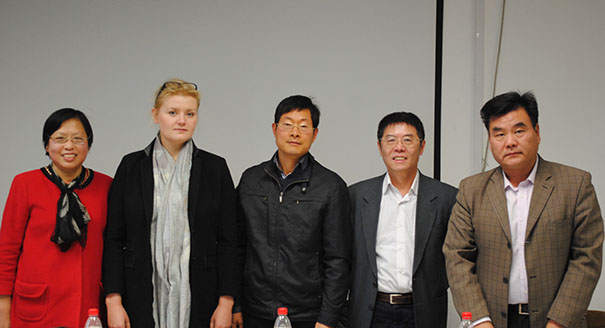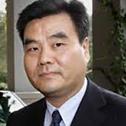{
"authors": [
"Zhang Lihua",
"Song Xinning",
"Zhang Jian",
"Aleksandra Kubat",
"Cui Hongjian"
],
"type": "event",
"centerAffiliationAll": "",
"centers": [
"Carnegie Endowment for International Peace",
"Carnegie China"
],
"collections": [
"China’s Foreign Relations"
],
"englishNewsletterAll": "",
"nonEnglishNewsletterAll": "",
"primaryCenter": "Carnegie China",
"programAffiliation": "",
"programs": [],
"projects": [],
"regions": [
"East Asia",
"China",
"Western Europe"
],
"topics": [
"Foreign Policy"
]
}
China-EU Relations and the Role of Cultural Diplomacy
Thu, December 18th, 2014
Beijing
Diplomatic exchange between Chinese and European leaders has become increasingly frequent and robust in recent years. Last November, Chinese President Xi Jinping met with then-president of the European Commission José Manuel Barroso and then-president of the European Council Herman Van Rompuy. In 2014, both Xi and Premier Li Keqiang made trips to Europe. While such state visits are a vital part of healthy diplomatic relations, tourism and exchanges between ordinary citizens through cultural centers are also important to strengthening ties.
Carnegie–Tsinghua’s Zhang Lihua hosted a panel of leading scholars to assess how people-to-people interactions foster cooperation between China and its largest collective trading partner and how cultural diplomacy can further enhance Sino-EU relations.
Discussion Highlights
- Three Pillars of China-EU Cooperation: The comprehensive strategic partnership between China and the EU has grown since its launch in 2003. Panelists noted that the first two pillars, economic and political dialogue, remain important. After all, the EU has been China’s largest trade partner for the past decade. In recent years, however, the third pillar—people-to-people exchanges—has gained traction and elevated cultural matters onto the bilateral agenda. Panelists asserted that both sides recognize how important sociopolitical ties are, prompting a concerted effort to enhance soft power through cultural influence.
- Cultural Diplomacy and Shared Identity: Participants pointed out that shared history and intertwined politics have motivated Europeans to try to foster a shared European cultural identity that simultaneously affirms disparate national and subnational modes of cultural expression. Panelists posited that EU officials have begun promoting cultural similarities as a catalyst for European innovation and human capital development.
- Internationalizing Cultural Heritage: Beijing and Brussels both recognize that cultural mores hold normative power and enhance a country’s standing on the international stage. Participants noted that institutions like the British Council, the Goethe Institut, and the Confucius Institutes are instrumental in promoting their respective states’ core values by strengthening people-to-people exchanges. By investing in such initiatives, China and Europe will continue to build enduring ties across national borders, panelists concluded.
- Fostering Cultural Dialogue: Participants asserted that European cultural diplomacy is about more than simply promoting cultural practices and values overseas. Rather, such overtures involve engaging other countries, including China, in a sustained dialogue about which beliefs are commonly held and where misunderstandings are rooted. Panelists insisted that people-to-people interactions are crucial to achieving a grassroots approach that spreads cultural traditions and ideas among ordinary citizens as well as high-level government actors. Participants maintained that both China and Europe remain intent on engaging more deeply with external actors to project a larger, more proactive role in global cultural exchanges.
- Lingering Differences: Panelists acknowledged that although ties between Europe and China have strengthened in recent years, significant differences remain. As a single centralized state, China does not conceptualize governance in the same terms as a multi-state entity like the EU does, particularly in the areas of foreign policy and social order. Public poll data in Europe and China suggests that the public on both sides harbor concerns that disparate perspectives could limit future cooperation.
Zhang Lihua
Zhang Lihua is a resident scholar at the Carnegie–Tsinghua Center for Global Policy where she examines how China’s core values affect Chinese foreign policy. Zhang is also director of the European Studies Center at Tsinghua University’s Institute of International Studies. Her other research interests include political theory, European politics, and contemporary Chinese politics and diplomacy.
Song Xinning
Song Xinning is deputy dean of the School of International Studies at Renmin University and director of the university’s Center for European Studies. His research interests include China’s foreign policy and European politics and external relations.
Cui Hongjian
Cui Hongjian is a senior research fellow and director of the Department of European Studies at the China Institute of International Studies. His research interests include China-EU foreign relations and Sino-European economic and trade cooperation.
Zhang Jian
Zhang Jian is deputy director of the European Research Institute at the China Institutes of Contemporary International Relations. His research interests include Europe’s integration and EU foreign policy.
Aleksandra Kubat
Aleksandra Kubat is a PhD candidate at King’s College in London and a research fellow at Renmin University. Her research interests include neo-Confucianism and the methodologies of Chinese social science research.
Carnegie does not take institutional positions on public policy issues; the views represented herein are those of the author(s) and do not necessarily reflect the views of Carnegie, its staff, or its trustees.
Event Speakers
Zhang Lihua
Former Resident Scholar, Carnegie-Tsinghua Center for Global Policy

Zhang Lihua was a resident scholar at the Carnegie-Tsinghua Center until June 2020.
Song Xinning
Zhang Jian
Aleksandra Kubat
Cui Hongjian

Cui Hongjian is a senior research fellow and director of the Department of European Studies at the China Institute of International Studies.